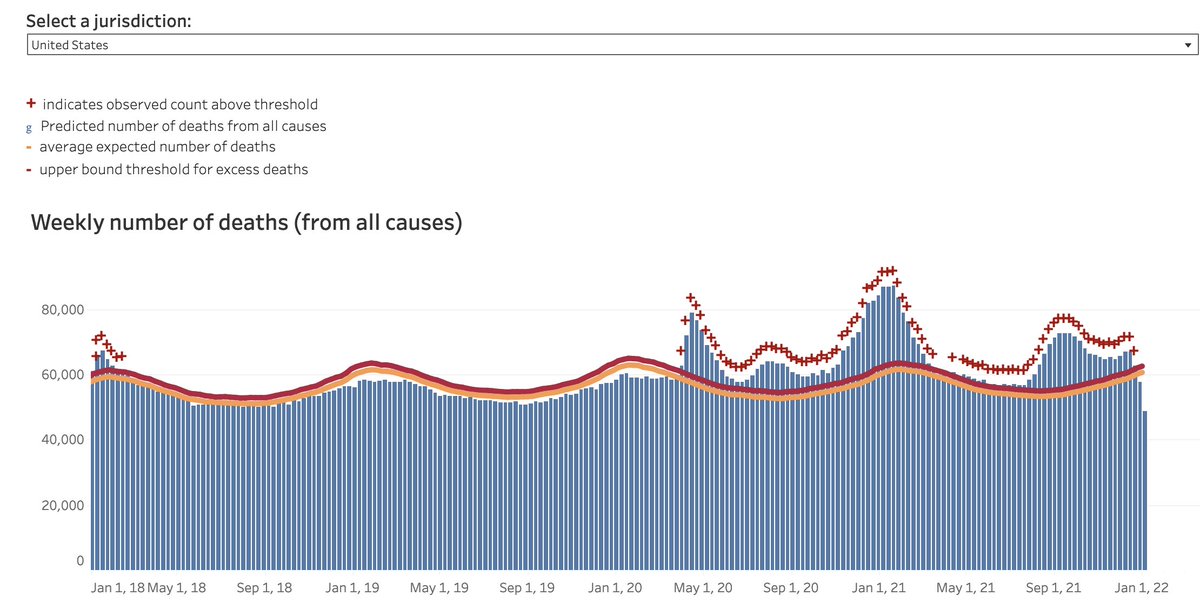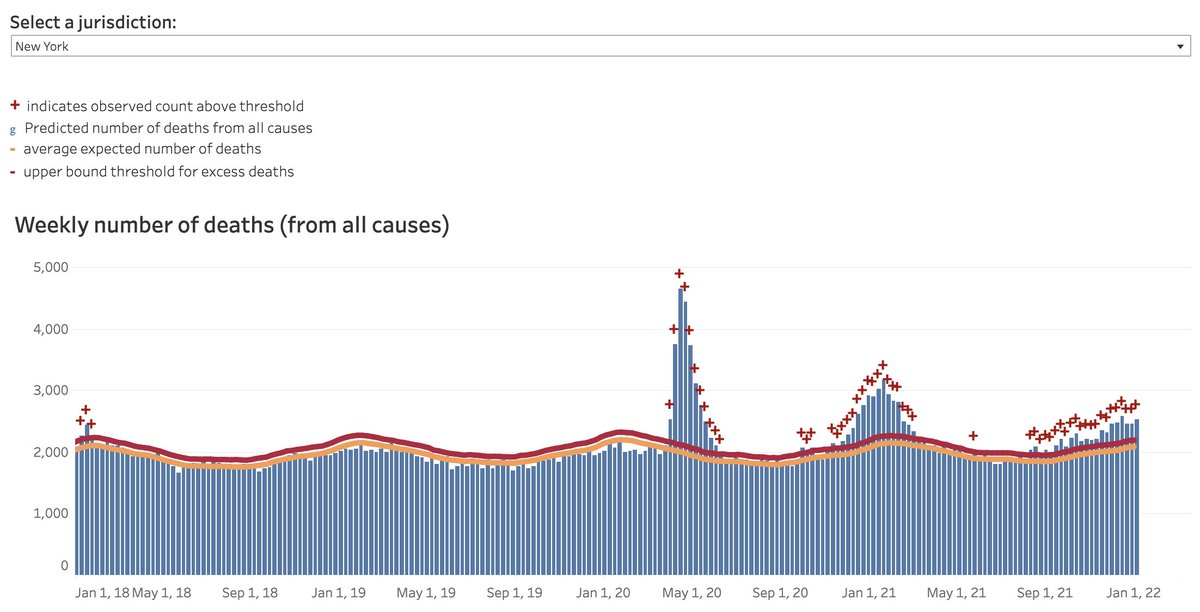Omicron is causing a TSUNAMI, not a wave, of infections in the US. No one knows what will come next with Covid, but we can make a big difference now by taking simple actions to shield the vulnerable & protect health care. Here's where we are—and where we might be headed. 1/thread
We’ve learned a lot about Omicron in the past two months. It’s stunningly transmissible and has left Delta in the dust. Omicron is far less likely than Delta to cause severe disease, especially in people who are vaccinated and boosted. 2/
We’ll know more in a few more weeks, but it appears that the current spike in Covid cases driven by Omicron may subside nearly as quickly as it rose, as happened in South Africa. 3/ https://t.co/Zf8ZBfMgrl

But we're far from out of the woods. Rapid increases in cases are leading to increases in hospitalizations, ICU admissions, and deaths, especially among the unvaccinated, and these may continue to increase for several weeks. 4/
The latest CDC data shows a stunningly high 29% test positivity rate. That means we’re missing a LOT of cases. There’s no doubt Omicron is making many people sick, but how concerned should we be? How do we square “less severe” with record-setting cases and hospitalizations? 5/
How many people have Omicron in the US today? A stunning number. We’re diagnosing ~1 million a day and likely missing 3-5 times that many. People are potentially infectious for around 5 days (1-2 days before diagnosis and a few days after)... 6/
...So nearly one in 10 people in the country today may have Covid. That’s why @CDCgov was right to adjust isolation and quarantine recommendations before the Omicron flash flood. 7/
Since Covid emerged, people have compared it with flu. There’s a lot people don’t understand about flu—including that it kills up to 50,000 people a year in the US and floods hospitals during many flu seasons. 8/
For the past 18 months, it’s been flatly wrong to compare the impacts of Covid with flu. With Omicron and vaccines, the calculation has changed, but we still need to look at the full picture. And we definitely shouldn’t dismiss the real problems we’re facing. 9/
On an INDIVIDUAL basis, the severity of Omicron is far less than Delta and roughly equivalent to flu, especially for people who have been vaccinated. https://t.co/Ah5xNCSa3R 10/
That DOESN’T mean Omicron is “mild” or that it’s not a big problem right now, especially for the unvaccinated. Those who are hospitalized and test positive for Omicron are much more likely to be unvaccinated. https://t.co/sgR0k1yrE2 11/
What makes Omicron MORE devastating than flu is the pace. Instead of a 3-4 month flu season, Omicron could cause 2-3 times as many cases in 3-4 WEEKS—as much as 10 times the number of cases per week. 12/
What’s more, we’re experiencing the Omicron spike on top of rising flu cases. It will be crucial to monitor excess deaths (or deaths above baseline) in the coming weeks to parse the burden of both diseases. https://t.co/TG3GrOHdLQ 13/ https://t.co/TnfvIlGj2G


We’re facing a tsunami, not a wave. Many hospitals are getting overwhelmed. https://t.co/2FoXzjMEpz 14/
The big variable is the large number of people—about a quarter of Americans age 5 and older—who aren't fully vaccinated. Only 40% of those eligible for a booster have received one. In some places, including the South & Rocky Mountain regions, vaccination rates are far lower. 15/
Although most people requiring hospitalization from Covid are unvaccinated, some vaccinated people will get very sick, some will get long Covid, and anyone who’s infected can spread illness to those at higher risk for severe Covid. That’s why we must keep up our defenses. 16/
Age and underlying health status matter a lot in how people deal with illness, so all of us need to assess our own individual risk level and take steps to avoid infection—especially during the current surge, which isn’t likely to last long. 17/
Even if you don’t consider yourself at high risk, getting Covid may not be a walk in the park. It’s also not clear how much an Omicron infection protects you from getting it again. Generally, non-severe infections don’t cause strong immunity. https://t.co/nk6m8lcjjP 18/
Now is not the time to give up or “let it rip.” But that doesn’t mean Covid has to dominate our lives. We can make a big difference by taking simple actions to limit transmission, shield the most vulnerable from infection, and protect health care. 19/
That means vaccinating as many people as we can, wearing masks in public indoor spaces, quarantining appropriately and testing after exposure, isolating if we test positive or have symptoms, and ensuring universal availability of effective Covid treatments. 20/
A CDC report published today found that use of monoclonal antibody treatment among Black, Hispanic, and Asian patients is lower than among White and non-Hispanic patients. We must fix these disparities. https://t.co/FHEDqbI1sK 21/
Consider upgrading to more protective respirators such as N95 masks if they fit well and can be worn comfortably, per new guidance from CDC. https://t.co/STN0fJbBer 22/
We don’t know what’s coming next with Covid. Omicron could be the last big surge before it turns into a more manageable disease. Or Delta could re-emerge as Omicron wanes. Or there might be yet another variant that is both extremely transmissible AND highly virulent. 23/
Some people assume that Covid can only get weaker from here, but that’s not necessarily true. Only the future will tell what the future holds. https://t.co/Y5YKYLGlZb 24/
Everyone is so tired of the pandemic. But the virus is adapting and the quicker we adapt the less Covid will dominate our lives. If we work together we can minimize the impact of Omicron and be in a better position to handle whatever Covid—or the next challenge—throws at us. 25/
